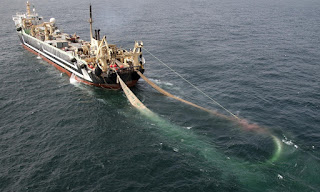Greenpeace petitions UK Government to ban supertrawlers catching 7,000 tons of fish

A YouGov poll, commissioned by Greenpeace, has shown that more than 4 in 5 members of the British public believe supertrawlers, factory trawlers over 100m long, should be banned from fishing in the UK’s Marine Protected Areas. 81% said supertrawlers should be banned from fishing in protected areas, with just 4% saying they should be permitted to fish in them. This comes after an investigation revealed that supertrawlers spent almost 3000 hours fishing in UK Marine Protected Areas in 2019, more than double the number of hours they spent fishing in UK protected areas in 2018. Marine Protected Areas exist to protect vulnerable ecosystems and marine life, like porpoises and reefs. The Dutch-owned Annelies Ilena supertrawler in UK waters A Greenpeace petition calls on the government to ban supertrawlers from protected areas, and has already gathered 125,000 signatures, including those of Sir Michael Palin, Joanna Lumley, Gillian Anderson Green MP Caroline Lucas, Alison Steadman and the exp...

